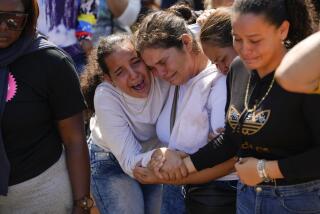Toxic Gases, Hot Ash From Volcano Wreak Havoc on Chilean Villagers
- Share via
LONQUIMAY, Chile — The birds are dead or gone. Maria San Martin says she “would like to have wings and fly away too.”
But she hasn’t the money to leave. It’s a plight shared by thousands in this and other villages beneath southern Chile’s 9,400-foot Lonquimay volcano, which rumbles and spits ash and toxic gases since erupting Christmas Day.
Lonquimay, a village of 3,800 people 21 miles from the volcano, is surrounded by mountains that block the winds that could bring in fresh air and blow out the ash and gases.
According to a special government census, 10,472 people in Lonquimay and several Indian reservations of the Mapuche tribe are being affected. Doctors say most are suffering irreversible damage to the central nervous system.
Breathing Difficult
A strong, disagreeable sulfurous odor pervades the area. Ash lodges in people’s teeth, their eyes itch and breathing becomes difficult.
Without birds, the dominating sound is the volcano’s crackle and roar, especially at night.
“Lonquimay is dead,” said San Martin, 43, the mother of four.
A team of 20 scientists, sent recently by the government’s National Science Commission, found that the air contained potentially toxic levels of particles including silicon, iron, calcium and aluminum. Fluoric, sulfuric and chloric gases also were found, and the poisons were detected in the drinking water.
According to local doctors, residents complain of headaches, stomach and back pains, itching of the eyes and throat.
‘Totally Incapacitated’
“I feel terrible, I can’t eat, and I feel totally incapacitated,” Nuria Quintana, 63, said. “The government should take us all out of here.”
Doctors in the area agree that evacuation is urgently needed, but the government in Santiago, 375 miles to the northwest, has so far refused.
The sub-secretary for regional development, Gen. Patricio Serre, maintained that the symptoms are psychosomatic.
“People are living a psychosis because of something they think might happen,” he said during a recent visit. “Air in Lonquimay is pure and fresh, probably even better than in Santiago.”
Santiago has a high level of smog.
Serre said the government has allocated the equivalent of $280,000 to help residents, especially those who have lost cattle to the volcano. But he added that the area would not be declared a catastrophe zone, which would make more money available.
Children Sent Away
About 15% of Lonquimay’s residents who had the money to go elsewhere have left. Many others who must stay, including soldiers and police assigned to the area, have sent their children away.
A confidential report by the chief regional government health official, a copy of which was obtained by the Associated Press, seems to contradict Serre’s assessment. The report, which recommends evacuation, says: “Human and animal life in the area is seriously threatened, and the environmental damage is grave.”
Trees and plants died first, followed by the birds and other animals. A man and an infant died recently, but government doctors say there is no evidence that they were victims of the volcano.
Masks Ineffective
Many residents wear government-issued face masks of cotton gauze, although experts said months ago that they were ineffective. Only some rich cattlemen, the military and police have masks with proper filters.
Animals are dying by the hundreds in the area, where most people make their living raising a few head of cattle on small ranches.
Hens and ducks have died by the thousands.
Emaciated oxen and cattle were seen in the villages. Some could not stand.
The town’s veterinarian, Carlos Ducom, said heavy concentrations of fluorine are often found in dead animals. The fluorine damages bones and causes paralysis, he said, and some dead cattle had as much as 3 1/2 pounds of ash in their stomachs.
Sick Animals
Erasmo Rivero, a father of five, said he wanted to sell his animals but they were too sick.
Without healthy oxen, people haven’t been able to gather firewood as the the snow and cold of the Southern Hemisphere winter begin to arrive.
Morelia Aguilera, a woman in her mid-40s, said she even misses the cockroaches and the worms. “My dogs no longer bark,” she said.
More to Read
Sign up for Essential California
The most important California stories and recommendations in your inbox every morning.
You may occasionally receive promotional content from the Los Angeles Times.










